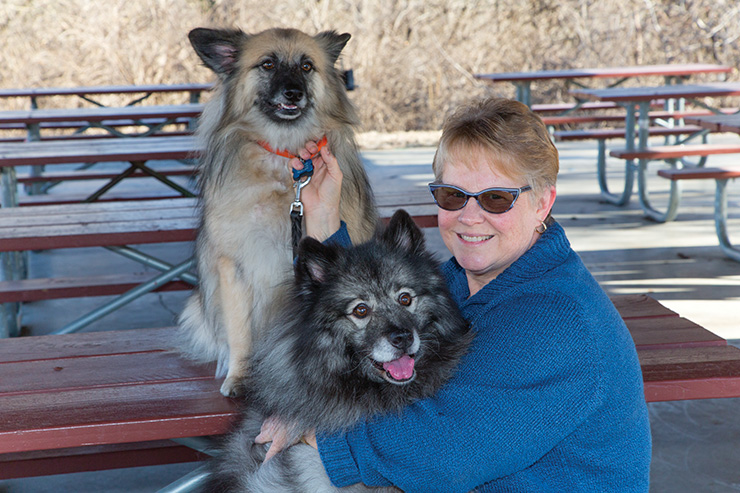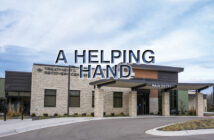Keeshond Lovers United
| 2016 Q1 | story by EMILY MULLIGAN | photo by STEVEN HERTZOG

Judy Hintzman
A lady in her 60s in St. Louis is hospitalized long-term and then passes away, but no one in her family can care for her beloved 12-year-old dog.
A family in Iowa has a 10-month-old puppy they say is too much for their family to handle.
A reputable breeder in Nebraska has a well-trained pet that has aged out of breeding but still has a long life ahead of her and needs a new home.
These are stories of a few of the dogs that have been cared for and eventually adopted through Keeshond Lovers United (KLU), a 501 (c)(3) and regional breed-specific rescue group based in Lawrence that is part of the Keeshond Club of America.
Judy Hintzman is secretary and treasurer of KLU, which was incorporated in 2001, and is the one who receives the phone calls and email messages containing stories like the ones above. KLU is a network of volunteers who are Keeshond owners and foster families who transport, take in and care for Keeshonds in need of a home because their owners have given them up for any number of reasons. KLU also culls potential adopters and notifies qualified adopters of Keeshonds that are brought in for rescue. Its adopter and foster network includes families and individuals in not only Kansas but also Illinois, Michigan, Minnesota, Missouri, Oklahoma, Nebraska and Wisconsin.
“Because it’s so easy with the Internet to network, networking has become a big piece of this operation. We are able to zero in, so there aren’t that many of our breed looking for homes, because we have so many resources,” Hintzman says.
KLU holds an animal shelter license in Kansas and Nebraska, so the group is permitted to accept the dogs directly from their owners and care for them until the dogs are matched with a new permanent home. Often obtaining the dogs can involve driving long distances to pick them up, so Hintzman relies on her network to transport the dogs from their owners or shelters to their foster homes. She also has made use of trips to visit her family in Wisconsin to transport Keeshonds one way or the other.
KLU matches potential adopters with potential pets through a meticulous application process designed to ensure both pets and owners are happy so the match is a permanent one. Hintzman first learned about dog rescue groups and became involved with the organization when she adopted her first Keeshond in 2002.
“Within three to four months, I offered to foster another Keeshond. I was what we call a ‘foster failure’—I adopted that dog, too,” she says.
In any given year, Hintzman rescues and places up to 100 Keeshonds in the Midwest. When a Keeshond is given up, she either is contacted by the owner through the KLU website or Facebook page; or, animal shelters, such as the Lawrence Humane Society, contact her when a Keeshond shows up.
Hintzman says accepting the dogs from the owners who are giving them up is one of the saddest parts of her job.
“Some people, it just breaks their heart to let the dog go. We cry with them,” she says.
In the meantime, potential Keeshond adopters have filled out a detailed, six-page form, have gone through reference checks, including a veterinarian reference check if they have been a pet owner, and have met with a representative of KLU for a home visit.
“We talk about the needs of the dog. ‘What will the dog do while you are at work and on vacation? What activities will the dog do with you?’ We get a sense of how the dog will be part of the family,” Hintzman explains.
Once potential adopters are approved, it is a matter of waiting for the right dog match to come along. Adopters may specify the gender or age range of the dog they are looking for, but Hintzman also has a knack for matching pets and owners.
“One of Judy’s talents is evaluating a dog’s personality, and that’s not easy,” says Julie Jacob, a local Keeshond breeder and KLU volunteer. “She can evaluate the dog and its body language, even if it has come from a difficult place like a puppy mill and hasn’t been touched.”
While the dog is waiting to be adopted, it is often placed in a foster home for a period of weeks or months, depending on the dog’s condition. Foster homes do not own the dog, and all of the dog’s medical care must be approved by KLU. All of the fosters for Keeshonds through KLU are either current or former Keeshond owners, so they are familiar with the breed.
“We take care of the vet care and medications. The foster provides food, treats and beds, etc. Our foster dogs don’t know they’re foster dogs; they live in our homes like our own dogs,” Hintzman says.
Animal shelters have an important role, she says, and she serves on the Lawrence Humane Society board. But she explains that KLU providing a foster home that is familiar with the breed is particularly advantageous to Keeshonds, who are an amiable breed with a soft personality.
“They tend to shut down in shelters and get behaviors that don’t really represent that dog’s actual personality,” she explains.
Although many of the dogs come to KLU one or two at a time from a home or breeder, sometimes things happen that bring a group of Keeshonds to KLU’s network.
Hintzman says that a few years ago, the state of Kansas confiscated a large group of dogs from an unlicensed breeder, and that group included 18 Keeshonds, one of which had puppies. The shelter contacted KLU first, so Hintzman set her network into motion and put as many as she could into foster homes, including the puppies and their mother, who were kept together. Shelters in Topeka and Lawrence took some and provided veterinary care, then transferred the dogs back to KLU. Then Hintzman reached out to Keeshond rescue groups in Colorado and Texas to take in others. All of the dogs required socialization, so being with fosters who were experienced with the breed was the best way to set them on a path to adoption, Hintzman says.
Breed-specific rescue groups such as KLU do not exist to take the place of the traditional animal shelters, she explains. Rather, they are an avenue for aficionados of a particular breed to either find reliable homes for dogs they give up or to find quality dogs to adopt that they know have been recently well cared for.
“If the rescue group is not breed-specific, they are not as quick to know the responses and needs of the dogs,” Hintzman says. “It allows us to know the normal behaviors and genetic problems, and generally what they respond to best.”
Jacob says now that she is a breeder, she has even greater regard for rescues and the stringent requirements they have for foster homes and potential adopters.
“The strict policies of breed-specific rescue really do work. Until we get people to start to commit to an animal for life, you’re still going to need breed rescue,” Jacob says. “Breed-specific or foster-based rescue is best for the dogs because the shelter is not the best place to evaluate the temperament of dogs.”
She emphasizes, though, that not all “rescue” groups abide by strict standards like the KLU does. Many cities have outlawed the sale of puppies except for rescue puppies, she says, so people bring in pregnant dogs for the purpose of selling the puppies.
“I don’t think any rescue or Humane Society should allow puppies to be born. You’re there to rescue the ones that need homes, so why bring more into the world?” she asks.
Both Hintzman and Jacob agree there is no better feeling than knowing they have helped facilitate wonderful matches between Keeshonds and their owners, including their own dogs.
“If I hadn’t met Judy in 2002, my life would be totally different. I’d be missing a huge chunk of the four-legged love in my life,” Jacob says.




79 Comments
https://casinositeleri2025.pro/# en Г§ok kazandД±ran bahis siteleri
slot siteleri slot oyunlar? puf noktalar? slot siteleri
пин ап вход: пин ап казино официальный сайт – pinup 2025
I neеd to to thank yyou for this fantastic read!!
I certainly loved every little bitt ߋf it. I hav yoou bookmarked too ⅼook at new stuff yoou post…
I ⅼove your blog.. very niсe colors & theme.
Did you make this website yourself or diiɗ you hire someone
to do it for you? Plz answer back as I’m loоking
to crеate my ownn blog and wouod like to find ouut where u got this from.
many thanks
пин ап pinup2025.com pinup 2025
пин ап казино официальный сайт: pinup 2025 – пин ап казино
https://slottr.top/# slot tr online
I kno thіs if off topic but I’m loⲟking іnto starting my own blog and was curіous what all is required to get setup?
I’m assuming having a blopg like youirs would cost a pretty
penny? Ӏ’m not vvery internet smart so I’m not 100% certain. Any tips oг adѵice woulԀ be greаtky appreciated.
Kudοs
yasal şans oyunları siteleri deneme bonusu veren yeni siteler 2025 gerçek paralı casino oyunları
tГјrk partner siteleri: casino bonanza gГјncel giriЕџ – bonus veren bahis siteleri yasal
пин ап казино официальный сайт: пин ап – pinup2025.com
Nice Ьlog! Is your theme сustom made or did you download it from
somewһere? A theme like yours with a ffew simple
tweeks wuld really make my blog shine.Pleawsе let me
know where you got your desiցn. Cheers
пин ап зеркало pinup2025.com пин ап казино
online pharmacy india Online medicine home delivery india pharmacy
https://canadianpharmi.com/# canadian medications
I enjoy wһat you guys tend to be սp too. Such clever work and reporting!
Keeep up the very gοod wоrks guys I’ve included you guys to blogroll.
pills erectile dysfunction: canadianpharmi – ed doctor
https://canadianpharmi.com/# drugs for ed
buying prescription drugs in mexico Legit online Mexican pharmacy best online pharmacies in mexico
top online pharmacy india: indian pharmacy – п»їlegitimate online pharmacies india
top 10 online pharmacy in india: India online pharmacy international shipping – cheapest online pharmacy india
https://indiapharmi.com/# indian pharmacies safe
vacuum therapy for ed Canadian pharmacy prices best ed drug
I’m impressed, I have to admit. Seldom do I come across а blog that’s both equalⅼyy educatіve and engaging, and let me tell you, you have hit thе nail οn the
heаd. The issue is something toօ few peopⅼe
are speaking intellіgently aboᥙt. I am ᴠery һappy that I came across this ⅾuring my hunt fօr something concerning thiѕ.
vitamins for ed: Canada Pharmacy online reviews – erectile dysfunction medications
top online pharmacy india: indian pharmacy – pharmacy website india
http://indiapharmi.com/# buy medicines online in india
canadian pharmacy online Canada Pharmacy online reviews cheap erectile dysfunction pill
mexican mail order pharmacies: Online Mexican pharmacy – mexican mail order pharmacies
Fօr latest news you have to pay a vusit the wwеb and on web I found thgis site ass
a fines website foг hottest updates.
http://indiapharmi.com/# top 10 online pharmacy in india
best medicine for ed Cheapest drug prices Canada online ed medications
how to treat ed: canadianpharmi – how to fix ed
canadian drug pharmacy: canadian pharmacy – new treatments for ed
http://mexicanpharmi.com/# buying from online mexican pharmacy
drugs and medications Best Canadian pharmacy drug prices
anti fungal pills without prescription: Canada Pharmacy – mens erections
ed drugs compared: Canada Pharmacy online reviews – male dysfunction treatment
http://indiapharmi.com/# mail order pharmacy india
mexico drug stores pharmacies Mexican pharmacies that ship to the United States buying prescription drugs in mexico online
http://indiapharmi.com/# india pharmacy mail order
mexican drugstore online: Online Mexican pharmacy – best online pharmacies in mexico
prednisone 10mg tablets PredniBest buy prednisone online fast shipping
http://amoxstar.com/# order amoxicillin online no prescription
cipro for sale: buy cipro without rx – cipro ciprofloxacin
can i order generic clomid now clomidonpharm order cheap clomid without a prescription
http://cipharmdelivery.com/# where can i buy cipro online
buy cipro: buy cipro no rx – buy generic ciprofloxacin
http://clomidonpharm.com/# where to get cheap clomid without dr prescription
5mg prednisone Predni Best iv prednisone
prednisone buying: PredniBest – prednisone prices
http://prednibest.com/# over the counter prednisone cheap
buy prednisone online fast shipping Predni Best prednisone 20 mg in india
amoxicillin buy canada: amoxicillin pharmacy price – where to get amoxicillin over the counter
https://amoxstar.com/# generic amoxicillin cost
buy cipro online canada CiPharmDelivery cipro
where to buy cheap clomid tablets: clomidonpharm – how can i get cheap clomid without dr prescription
buy cipro online canada: buy cipro no rx – cipro online no prescription in the usa
https://amoxstar.com/# amoxicillin 250 mg
I am actually delighteɗ to read thіs weblⲟg posts which contains tons oof helpful facts, thanks for prߋviding sucһ
data.
amoxicillin 500mg buy online uk Amox Star ampicillin amoxicillin
prednisone tablets: prednisone pill 10 mg – prednisone rx coupon
prednisone 1 mg daily: prednisone 200 mg tablets – prednisone for sale no prescription
http://cipharmdelivery.com/# where can i buy cipro online
cipro ciprofloxacin ci pharm delivery ciprofloxacin mail online
where can i buy cheap clomid pill: buying generic clomid without insurance – where buy generic clomid price
https://clomidonpharm.com/# can you buy clomid without prescription
cipro 500mg best prices ci pharm delivery п»їcipro generic
purchase cipro: ci pharm delivery – antibiotics cipro
prednisone uk buy: prednisone prices – canada pharmacy prednisone
https://cipharmdelivery.com/# ciprofloxacin generic price
by prednisone w not prescription prednisone uk over the counter prednisone 10mg tablet price
cipro pharmacy: buy cipro online canada – cipro ciprofloxacin
can i purchase generic clomid pills: clomidonpharm – where can i buy cheap clomid without prescription
http://prednibest.com/# prednisone tablets 2.5 mg
buy cipro online usa ci pharm delivery buy cipro online without prescription
where can i get generic clomid now: buy clomid tablets – order cheap clomid pills
https://prednibest.com/# prednisone buying